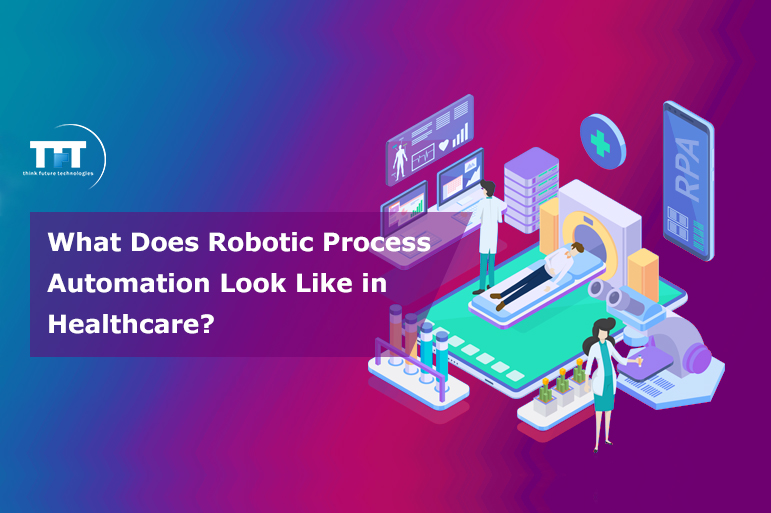Technology is growing very fast, and no sector is untouched with its impact. Robotic Process Automation (RPA) is one such outcome of technological development, which is expected to touch $5 Billion by 2024.
According to research, the Healthcare industry will be one of the rapidly growing sectors in this period. These days, healthcare organizations are upgrading the quality of service and costs to their customers and robotic process automation will go a long way in aiding that.
Most healthcare organizations are implementing RPA using their existing IT environments. This emerging technology has the potential to help these healthcare organizations to save money and time on one side and improve the quality of their service on the other.
The main focus of RPA usage in the healthcare industry is to decrease manual effort, improved throughput, and standardize processes. It can help to improve patient data management, monitor medical lapses, and clinical support. In this blog today, we will give an overview of the role RPA is playing in the healthcare environment.
What is Robotic Process Automation?
Robotic Process Automation is the technology using which one can configure computer software to automate the repetitive routine business process. This configured computer software or robots integrate the actions of human interactions with business processes and captures data to manipulate the applications just like human beings. They even trigger responses and make communicate with other systems and can perform repetitive tasks very efficiently.
It is like some robot is performing the action in your computer like a human being, not a robot exactly, it’s more like software.
Robotic process automation (RPA) – Use Cases in Healthcare Industry
Some of the RPA-based use-cases for the healthcare industry are given below:
-
Extracting Data
Healthcare industries can store, retrieve the patient data stored in their databases, and route them to the correct patient using RPA.
The employees need to log in with secured credentials and access the patient data within the network. The documents containing patient names and credentials are fed to the RPA software so that it can log in with the correct credentials to access the data of the right patient.
-
Improving the healthcare cycle
The healthcare industry collects the data of all their patients, be it personal or medical history.RPA can help healthcare organizations by streamlining the process of extracting and optimizing this data.
RPA software can analyze a large amount of data and provide meaningful insights. These insights can be further used for making a much more effective diagnosis thereby improving the process of patient treatment.
Moreover, the software will track the treatment data about the patients, meaning the doctors can spend their time attending to the patients. This will save time for both, the patients as well as the doctors.
-
Scheduling new appointments:
RPA can help in streamlining the appointment system at healthcare organizations. Whenever a patient fills a new appointment form online, the RPA software directs the appointment request into the appropriate work queue.
The selection of queue depends upon several factors consisting of the location, diagnosis, and the kind of insurance. This efficient appointment system will save the time of all the stakeholders involved.
-
Effective claiming and billing system
RPA can make the claiming and billing system dynamic and effective, which is the need of the healthcare industry today. It is quite time-consuming to manage the claims at hospitals especially when they involve as many sub-processes as they do. These sub-processes include the input of claims, and it’s evaluation, processing, and dealing with appeals.
With the help of RPA, these processes can get automated, making the claim system faster and efficient.
-
Self Servicing new Terminals
RPA can build a kiosk that allows the patients to enter their information and scan their ID and insurance card. All the data can then be loaded to some triage system so that the front desk employee can review the patient information.
To smoothen this type of processing using RPA, healthcare industries need a user-friendly kiosk that should be easy to operate by patients. Additionally, the dashboard can be integrated with the database of the healthcare company, so whenever a new patient boards, their data is updated throughout the systems of the hospital.
-
Optimized regulatory compliance
With RPA, healthcare organizations can ensure that every process they are following is being tracked, organized, and documented. All this information tracking can help healthcare organizations to be ready for external audits anytime.
How to Make a Successful RPA Implementation
Owing to the scarcity of trained staff the implementation of the RPA is a challenge, more so since RPA is but an emerging science. Therefore, to make the best out of RPA, organizations must focus on determining the problem they are trying to solve, and what are they aspiring to achieve in a particular timeframe.
For proper implementation, hospitals need to follow the best practices like, training the staff, conduct thorough research, and review the security. Also, organizations can partner with other organizations for the implementation of this technology to make the best out of it.
Conclusion
All in all, RPA can alter the future of the healthcare industry. RPA helps to automate routine tasks, and minor errors can be removed automatically while improving the experience of the patients. RPA has come out as a flexible and affordable option, and thus, many healthcare industries are getting benefitted by opting for this technology in the workplace. As a result of this, the organizations are transitioning from manual to automated ones.












